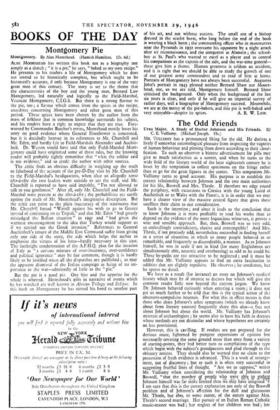BOOKS OF THE DAY
Montgomery Pie
Montgomery. By Alan Moorehead. (Hanish Hamilton. 12s. 6d.)
ALAN MOOREHEAD has written this book not as a biography nor simply as a sketch ; " it is a pie," he says, " baked to my own recipe." He presents to his readers a life of Montgomery which he does not intend to be historically complete, but which ought to be historically accurate, if only because Montgomery is one of the very great men of this century. The story is set to the theme that the characteristics of the boy and the young man, Bernard Law Montgomery, led naturally and logically to the Field-Marshal, Viscount Montgomery, C.I.G.S. But there is a strong flavour to the pie, too ; a flavour which comes from the spices in the recipe, anecdotes concerning Montgomery and other great men of this period. These spices have been chosen by the author from the mass of folklore that in common knowledge surrounds his subject, and his readers have a right to expect that they are true. Fore- warned by Commander Butcher's errors, Moorehead mostly bases his story on good evidence where General Eisenhower is concerned, but it is decidedly hearsay in its references to Mr. Churchill and Mr. Eden, and hardly fair to Field-Marshals Alexander and Auchin- leck. Dr. Watson would have said that only Field-Marshal Mont- gomery could have originated some of these tales, but the knowing reader will probably rightly remember that " what the soldier said is not evidence," and so credit the author with other sources.
The critic finds an obvious difficulty in weighing up the truth or falsehood of the account of the pre-D-Day visit by Mr. Churchill to the Field-Marshal's headquarters, when after an allegedly tense tete-a-tete the two leaders wept_'_ outside to see the staff, and Mr. Churchill is reported to have said impishly, " I'm not allowed to talk to you gentlemen." After all, only Mr: Churchill and the Field- Marshal were present at the the-Li-tete ; the probabilities are surely against the truth of Mr. Moorehead's imaginative description. But the critic can point to the plain inaccuracy of the statements that Mr. Churchill forced " Wavell against his wish to go to Greece instead of continuing on to Tripoli," and that Mr. Eden " had grossly misjudged the Balkan situation " in 1941 and " had given the warmest encouragement to the idea that Turkey would support us if we carried out the Greek invasion." References to General Auchinleck's tenure of the Middle East Command suffer from giving only one side of the story, the side which helps the author to emphasise the virtues of his hero—hardly necessary in this case. The forthright condemnation of the A.F.H.Q. plan for the invasion of Italy as " a curious mixture of over-insurance, over-confidence and political ignorance " may be fair comment, though it is hardly likely to be justified when all the dispatches are published ; so may the apparent dismissal of the Italian campaign as being of no im- portance to the war—admittedly of little to the " pie."
But the pie is a good pie. One bite and the appetite for the whole is whetted. Moorehead's gifts in narrative of events which he has watched are well known in African Trilogy and Eclipse. In this book on Montgomery he has turned his hand to 'another part
of his art, and not without success. The small son of a bishop dressed in the scarlet beret, who long before the end of the book is wearing a black beret ; the commanding officer who in manoeuvres near the Pyramids in 5932 overcame his opponent by a night attack after air reconnaissance, and the conqueror at Alamein ; the school- boy at St. Paul's who wanted to excel as a player and to control his companions as the captain of the side, and the war-time general— these give him a theme. Human greatness is seldom an accident, and it is right that we should be able to study the growth of one of our greatest army commanders and to read of him at home. Portraits of Montgomery have not always been successful. Augustus John's portrait in 1943 pleased neither Bernard Shaw nor Moore- head, nor, so we are told, Montgomery himself. Bernard Shaw criticised the background. Only when the background of the last six years is clear, and only if he will give an impartial survey of earlier days, will a biographer of Montgomery succeed. Meanwhile, we are at the mercy of the pie-bakers, and this pie is well-baked and
very enjoyable—despite its spices. A. R. W. Low.


































 Previous page
Previous page